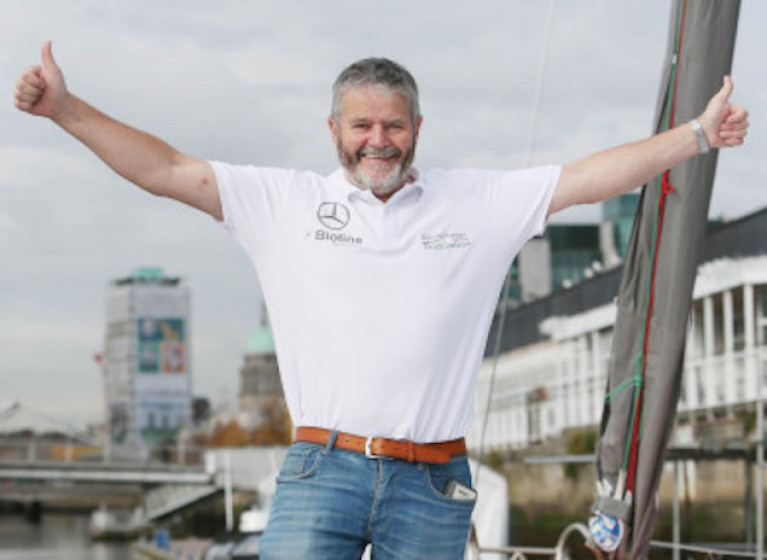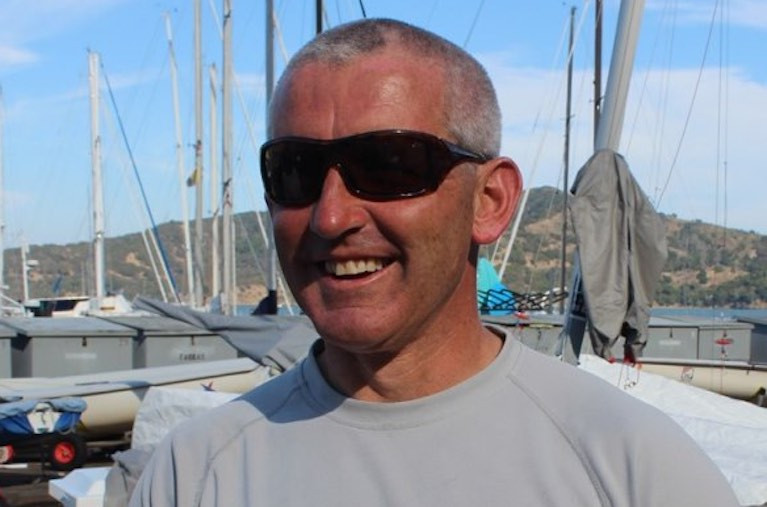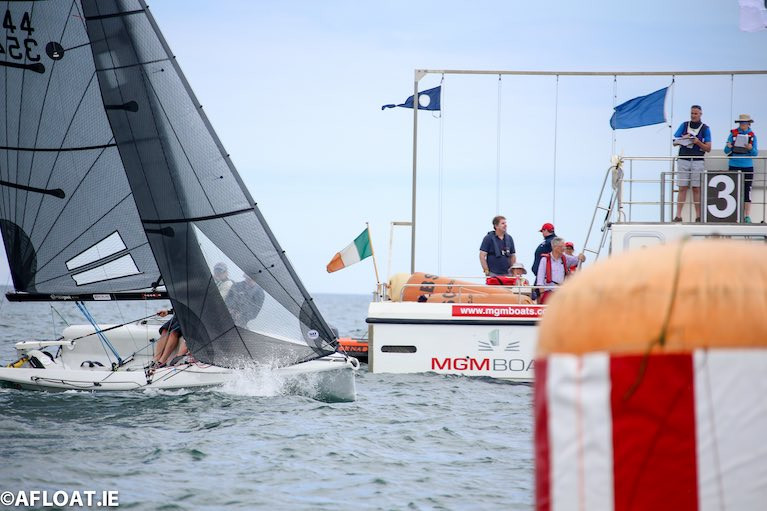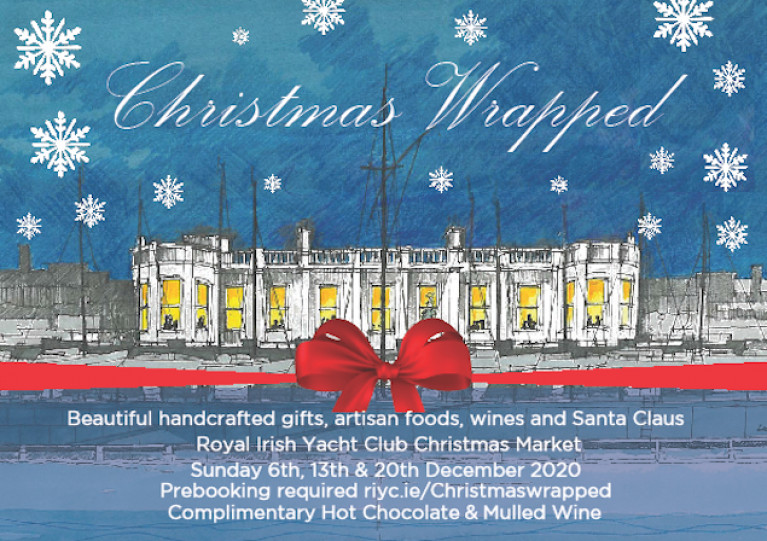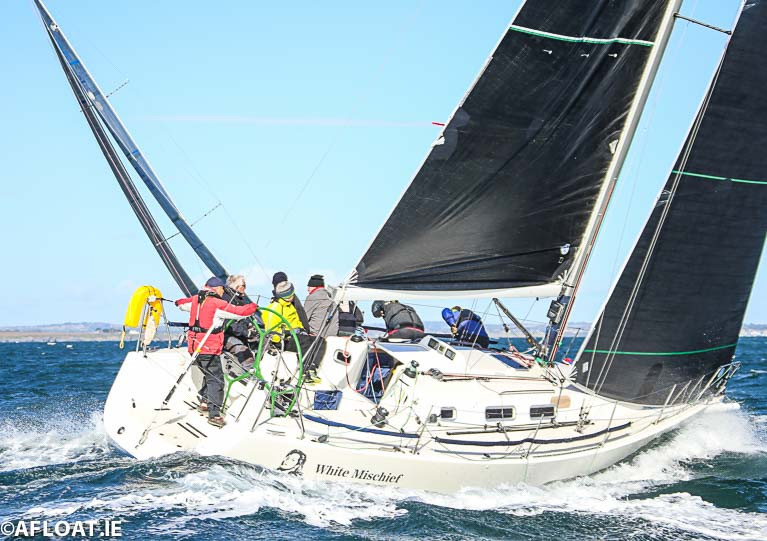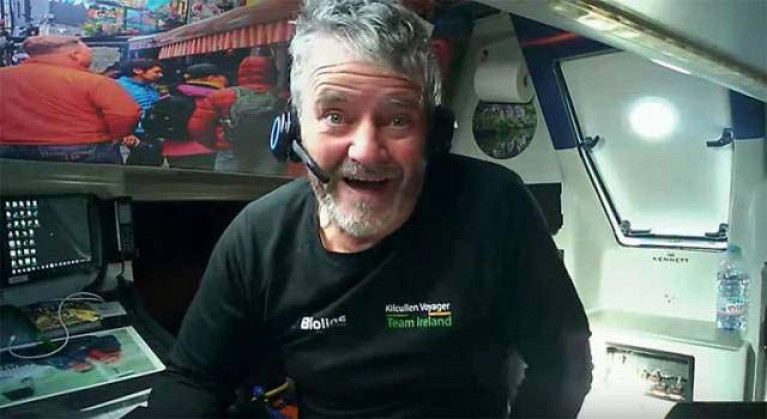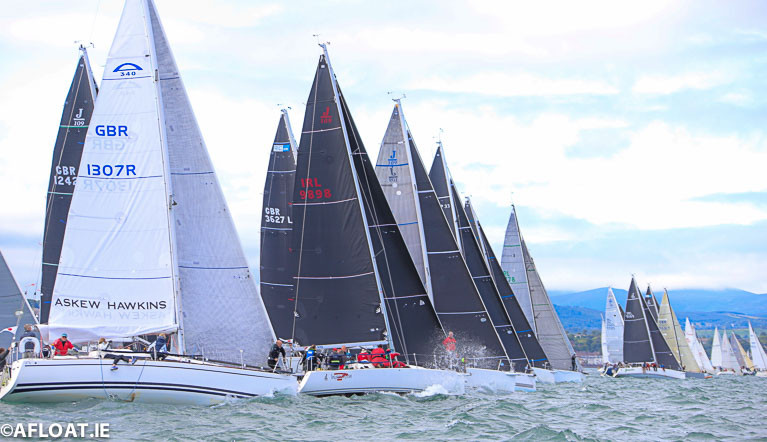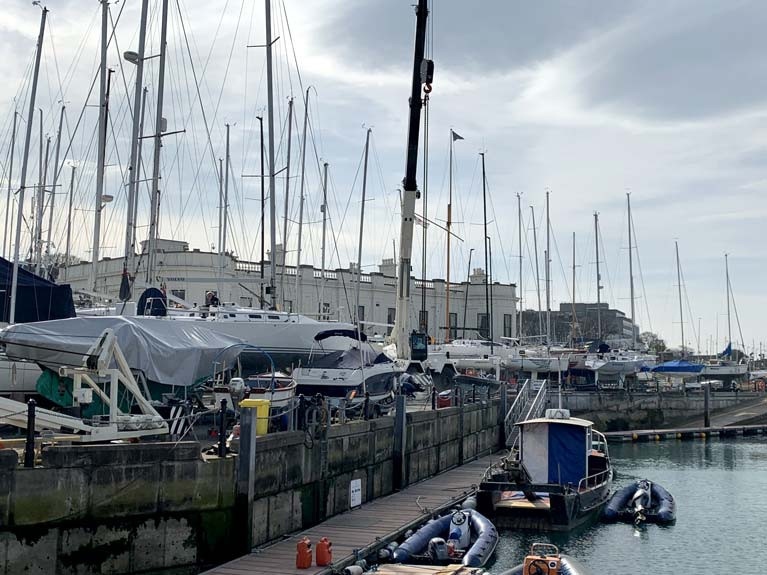Displaying items by tag: Royal Irish Yacht Club
Royal Irish Yacht Club Dun Laoghaire Dingle Champion Rockabill VI is Aiming for a Hat Trick
As well as the defending champion, Dun Laoghaire's Royal Irish Yacht Club will have three other yachts in Wednesday's Dun Laoghaire to Dingle Race.
The 14th edition of the 280-mile offshore fixture starts at 2 pm off Dun Laoghaire Harbour and is organised by the National Yacht Club.
Paul O'Higgins will defend his D2D crown in the JPK 10.80 Rockabill VI and aim to make it three in a row for the RIYC after previous Rockabill VI victories in 2017 and 2019.
The champion is joined by some potent RIYC clubmates; Andrew Algeo's J99 Juggerknot II, the Beneteau First 40 Prima Forte as well as George Sisk's Xp 44, WOW.
 Patrick Burke and Sean Lemass's First 40, Prima Forte
Patrick Burke and Sean Lemass's First 40, Prima Forte
Patrick Burke and Sean Lemass's First 40 arrived in Dublin Bay in January last year and in her first season won DBSC's best performing new yacht award. As regular Afloat readers will know, this all-round performer was previously named La Response, and before that formerly known as Courier Zen and a veteran of several Commodore's Cup teams under former owner Andrew McIrvine, an ex Admiral and Commodore of the Royal Ocean Racing Club.
 Andrew Algeo's J99 Juggerknot II
Andrew Algeo's J99 Juggerknot II
Algeo's Juggerknot II crew, who finished eighth in the 2019 race, is joined for this edition by Figaro campaigner Kenny Rumball.
 George Sisk’s Xp 44 Wow
George Sisk’s Xp 44 Wow
George Sisk’s Xp 44 “Wow” was the 2019 Sovereign’s Cup winner in the coastal class, having delivered a hat-trick of wins and beating bigger sistership the Xp 50 Freya on her home waters off Kinsale in the Regatta’s Coastal Class but was scored as 'did not finish' in that year's D2D.
A fourth Royal Irish boat, Barry Cunningham's Sun Odyssey 490, ConQuestador is contesting the IRC Cruiser class.
Royal Irish Yachts in the 2021 Dun Laoghaire to Dingle Race
- ConQuestador Jeanneau Sun Odyssey 490, IRL4900, Skipper: Barry Cunningham, Class: IRC Cruiser, Rating: 1.079
- Juggerknot II J/99, IRL 3990, Skipper: Andrew Algeo, Class: IRC Racing, Rating: 1.011
- Rockabill VI JPK 10.80, IRL 10800, Skipper: Paul O'Higgins, Class: IRC Racing, Rating: 1.05
- WOW X-Yachts Xp44, IRLl4419, Skipper: George Sisk, Class: IRC Racing, Rating: 1.124
- Prima Forte Beneteau, IRL4240, Skipper: Sean Lemass, Class: IRC Racing, Rating: 1.078
Dun Laoghaire Sportsboat Cup Postponed Til 2022
The Royal Irish Yacht Club at Dun Laoghaire Habour has announced it is 'sadly' postponing its planned May Dun Laoghaire Cup till 2022 due to the ongoing COVID-19 restrictions.
Regatta organiser David Ryan told Afloat 'We thank the sailors for their continued support and look forward to seeing everyone in 2022".
Enda O’Coineen's RIYC Talk on 'Across the Atlantic by Inflatable & Other Ways to Get Wet'
The Royal Irish Yacht Club's 'Home Together' virtual talk this Thursday 4th February will feature RIYC member Enda O’Coineen.
Enda will recount the extraordinary story of his epic transatlantic solo voyage onboard his 16-foot inflatable, the Kilcullen just over 35 years ago.
Having first made landfall in Dunmore East, upon arriving finally in Dun Laoghaire, Enda promptly sold the Kilcullen. It subsequently changed hands several times before Enda finally bought her back and restored her, reviving memories of some extraordinary adventures, long submerged and almost deliberately forgotten.
 The refurbished 5m Humber RIB in which Enda ‘OCoineen crossed the Atlantic in 1985
The refurbished 5m Humber RIB in which Enda ‘OCoineen crossed the Atlantic in 1985
Enda first attempted to cross the Atlantic by inflatable at the age of 22 and almost making it before capsizing off the west coast of Ireland – and being rescued by the NATO war fleet.
Seven years later Enda attempted the voyage for a second time and this time made-it into the record books.
Commences 19:30hrs contact [email protected] to register.
Full House for Prof’s Top Ten Dublin Bay Racing Tips at Royal Irish Yacht Club Webinar
North Sails Ireland’s Maurice “Prof” O’Connell’s top ten tips talk to RIYC Members and guests pulled in the crowds with a record-breaking 105 attending.
Prof’s insights for racing in Dublin Bay ranged on how to gain maximum advantage through adequate preparation before going afloat, through to the start line to sail trim principles/set-up and key boat handling manoeuvres for rounding marks.
Prof brought the audience through Dublin Bay geography and topography, the DBSC course card design, logic, mark locations and geometry as well as Dublin Bay currents.
He talked through the importance of correct onboard communications and providing clear information fundamental to sailing the correct course.
Prof, who never misses a DBSC race with his customers unless he is out of the country, concluded with “Rules of Thumb” for Dublin Bay racers. The talk was part of the RIYC “Home Together” series of virtual talks.
Royal Irish Yacht Club's Home Together Series “Winning Races in Dublin Bay" - Top Tips from North Sails Ireland's Prof O'Connell
The Royal Irish Yacht Club's successful 'Home Together' series of virtual talks returns this Wednesday 27th January at 19:30hrs with Maurice “Prof” O’Connell.
O'Connell from North Sails Ireland never misses a Dublin Bay Sailing Club (DBSC) race with his customers unless he is out of the country.
Over the years, he has raced in 100's of DBSC races in everything from the biggest IRC Cruiser 0 yachts to the smaller one-designs. He has put together his "10 Top Tips for racing in Dublin Bay" which he will share with RIYC members and guests.
Commences 19:30hrs contact [email protected] to register.
Across the Atlantic by Inflatable & Other Ways to Get Wet with Enda O’Coineen
On Thursday, 4th February Enda O’Coineen reprises memories of his epic transatlantic solo voyage onboard his 16-foot inflatable, the Kilcullen just over 35 years ago.
Having first made landfall in Dunmore East, upon arriving finally in Dun Laoghaire, Enda promptly sold the Kilcullen. It subsequently changed hands several times before Enda finally bought her back and restored her, reviving memories of some extraordinary adventures, long submerged and almost deliberately forgotten.
Commences 19:30hrs contact [email protected] to register.
Royal Irish Yacht Club's Christmas Market 2020
Royal Irish Yacht Club members in Dun Laoghaire Harbour can look forward to a 'Christmas Wrapped', the club's 2020 Christmas Market subject to the relevant COVID restrictions next month.
The Market aims to run on 6th, 13th and 20th December and will feature beautiful, hand-crafted gifts, artisan foods, wines. Santa Claus will also be in the Club.
Subject to pre-booking members can look forward to complimentary hot chocolate and mulled wine on arrival before entering the Christmas Wrapped experience featuring a range of specially curated gifts including Irish designed silks, ceramics, pampering botanicals and candles, flowers, foodie delights and much more.
The Club will have its own selection of Club wines, hampers, vouchers and gift ideas. Full details can be found here
When open, RIYC will be trading under the current Covid restrictions at that time. Face coverings, social distancing, pre-booking and reduced visitor numbers will all be observed.
Royal Irish Yachts Share the Spoils of Dublin Bay Sailing Club Season
The Royal Irish Yacht Club (RIYC) took the lion’s share of IRC prizes at the recent Dublin Bay Sailing Club (DBSC) prizegiving for the 2020 AIB sponsored season with wins in Cruisers Zero, One divisions and two of the club's premier awards.
DBSC broke with long-established tradition this year due to COVID-19 and its popular and long-established prizegiving for 300 boats in 22 different classes was not held, but that did not stop the award of the usual glittering array of trophies as Afloat reported here.
On top of the DBSC premier award of the Dun Laoghaire Harbour Trophy for the best new yacht in 2020 won by the club's Prima Forte (Patrick Burke) there were RIYC class wins for the JPK10.80 Rockabill VI (Paul O'Higgins) who won the Martin Cup for Thursday IRC racing in IRC Zero big boat class. The Club's XP44 Wow (George Sisk) won the ECHO trophy for Saturday racing in this class and Burke's Prima Forte took the Centenary Cup for Saturday ECHO racing.
 DBSC Dun Laoghaire Harbour Trophy winner, Prima Forte
DBSC Dun Laoghaire Harbour Trophy winner, Prima Forte
The Royal Irish J109 father and son team of Tim and Richard Goodbody were Thursday IRC winners in Cruisers One, winning the West Pier Officer's Cup for Thursday racing and in Saturday ECHO racing, Paul Bradley and Fintan Cairns lifted the Osterburg Cup sailing the Mills 31 Raptor.
In Class Two, Jim McCann's Peridot, was Thursday's champion on ECHO winning the Centenary Cup and in another ECHO victory for the club, Paget McCormack's Saki won the Cruisers Three Mercia Cup for Thursday racing.
In Class Five, Charles Broadhead's Persistence was the winner of the Burford Trophy for his win in Thursdays IRC Overall Div A while Grainne O'Shea's Gung-Ho was the victor in Sats A and B IRC Overall winning the White Sail Class Trophy.
 DBSC Osterburg Cup winner, Raptor
DBSC Osterburg Cup winner, Raptor
RIYC One Designs & Dinghies
It didn't stop there for the RIYC fleet as there were some top results in the one-design divisions too. As Afloat reported previously, Jimmy Conboy Fischer sailing Billy Whizz was awarded the club's Geroge Arthur Newsom Trophy for the best result in the one-design divisions. It was the first time the top prize had been awarded to the B211s.
In the SB20s, the Lunasa Trophy for Saturday Div B was won by the club's Ger Dempsey and Chris Nolan sailing Venuesworld. Dragon racing victory on Thursday's went to Zin Zan, skippered by Adrian Masterson. In the Mixed Sports boats class, the Saturday Sportsboat Cup went to Martin Ryan's J80, Jambiya.
In the dinghy classes, Guy Kilroy's Swift was the Goldsmith Cup winner for Wednesday Racing in the Water Wag class.
Full DBSC winners here.
The Royal Irish Yacht Club in Dun Laoghaire Harbour is launching its Virtual Regatta for members this Saturday with an online presentation by RIYC's round the world sailor Enda O’Coineen.
O'Coineen, whose Vendee Globe race bid to be the first Irishman to sail the world non-stop singlehanded ended when he was dismasted off New Zealand three years ago, will demonstrate how fellow RIYC sailors can compete for the inshore eSailing championships.
The tutorial starts online 14:30 hours followed by racing 15:30hrs
It's the latest in a series of online initiatives by the RIYC using software called ZOOM, each talk is presented by a RIYC Member or invited speaker.
A new Dublin Bay regatta involving the whole Dun Laoghaire sailing waterfront has been announced for July 31st to August 3rd.
The 'Dun Laoghaire Combined Clubs Solidarity Regatta 2020' is an initiative of all five of Dun Laoghaire's yacht clubs as a response to the COVID-19 interrupted season.
"The event is a joint effort of the DMYC, RIYC, RStGYC, NYC and DBSC", according to Mark McGibney, the sailing manager of the Royal Irish Yacht Club.
We plan to run this regatta from Friday 31st July to the 3rd August.
In these uncertain times, the clubs have also decided to 'book' the weekend of the 5th/6th September as reserve dates if the August dates fall through.
More details as we have them.
Read also: 2020 Irish Sailing Fixtures (The Beyond COVID-19 Version)
Royal Irish Yacht Club Postpones Annual Lift-In of Boats
The annual lift in of boats at the Royal Irish Yacht Club scheduled for April 1, that includes the biggest cruiser-racer fleet for next month's start of the Dublin Bay Sailing Club Summer racing series, has been postponed.
The lift-in is postponed pending confirmation of a new date.
In a message to members, the RIYC said that "following the Government’s announcement of mandatory measures, the boathouse is closed with immediate effect and services are suspended for the foreseeable future. We would also ask that you refrain from working on your boats at this time until further notice".
Dun Laoghaire Marina, where many of the yachts are moored, has also closed its doors to berth holders following the Government announcement.


























